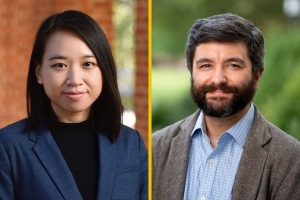
Two faculty members in the Department of Computer Science were selected to receive AI-Informed Discovery and Inquiry Seed Grants from the Johns Hopkins Data Science and AI Institute. Anqi “Angie” Liu and Tom Lippincott were announced as recipients early last week.
Each year the Data Science and AI Institute, in collaboration with the Office of the Dean of the Krieger School of Arts and Sciences, awards seed grants to bring together diverse, multidisciplinary teams, leveraging the integration of AI and data science to tackle pressing challenges across disciplines. Chosen from a competitive pool, the teams selected present proposals that demonstrate significant promise in AI-informed discovery and inquiry, showcasing their potential impact.
Liu’s research focuses on enabling machine learning algorithms to be robust to changing data and environments, to provide accurate and honest uncertainty estimates, and to consider human preferences and values in their interactions. She is particularly interested in high-stakes applications that concern the safety and societal impact of artificial intelligence. Liu will work on “Sociological Foundations of Learning with AI” along with Lingxin Hao, the Benjamin H. Griswold III Professor in Public Policy in the Krieger School’s Department of Sociology. Together, they will investigate principles and methods for developing AI for educational purposes, utilizing sociological theory to guide data collection and analysis. They will specifically focus on studying socioculturally shaped learning experiences, readiness, preferences, and goals, and will analyze how these affect students’ interactions with AI, thereby informing design choices and algorithm development for AI in education.
Lippincott’s research focuses on how machine learning can support and facilitate traditional scholarship in the humanities, particularly the use of unsupervised models structured for interpretability and isomorphism with respect to a domain of interest. He will work with Michael Harrower, an associate professor of archaeology in the Department of Near Eastern Studies, and Aidan Alme, an undergraduate student double-majoring in computer science and near Eastern studies, on a project titled “Monuments and Satellite Imagery,” the goal of which is to fine-tune and apply computer vision models to detect a newly-recognized type of structure in satellite imagery of northern Ethiopia. In addition to cataloguing occurrences of potentially novel material culture, the research will provide a testbed for comparing human and AI proficiency and determining the data and annotation quality needed to automate such remote sensing tasks.